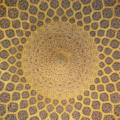In answer to the title…well, that depends on the practitioner. However, Insight meditation does aspire to it, although perhaps to a different version of it than does the yoga meditation of my last post. So, to get down to basics, Insight meditation is a contemporary name for Vipassana Meditation, which…
Eastern Religion
Dalai Lama During this last entry in my series on Buddhism, I’ll discuss three final concepts within Buddhist philosophy. Anatta: The Concept of No Self While few of us would admit to personality variances of the same degree as the fabled Dr. Jekyll/Mr. Hyde, many of us do manifest different…
Anicca: The Buddhist Concept of Impermanence As promised, in this post, I’m going to begin an explanation of five key Buddhist philosophies. So grab your prayer wheels and meditation cushions…Here we go! Dukkha, or Suffering/Dissatisfaction Aside from reincarnation, probably the most well-known Buddhist philosophy is that dissatisfaction or suffering is…
Buddha 400 to 500 years before the birth of Jesus, a sage of an entirely different tradition was born in the foothills of the Himalayans, in what is now called Nepal. Called the Buddha (or the awakened one) by his followers, he grew up as the pampered son of a…
In my first post on Taoism, I mentioned that the Tao Te Ching is the central text within Taoism. What many don’t realize is that the book is not only a compilation of philosophical wisdom about the Tao but was intended as a guide-book for government leaders. According to Taoism,…
Taoism is said to be one of the more cryptic spiritualties—but this reputation is really only due to one of its central texts: The Tao te Ching. Legend has it that an archivist for the Chinese government, Lao Tzu, decided to abandon city life and live out the remainder of…
Non-dualism has become an increasingly popular spiritual idea in the West, but long before it bumped up against our shores it has been known in India as Advaita Vedanta. A Single Consciousness So, just what is Advaita Vedanta, or non-dualism? Essentially, it’s the belief that all souls exist within a…
For most people, the fortune inside the typically bland Chinese fortune cookie is its most palatable part, for it delivers either a sunny forecast, or at worst, a vague aphorism. Just how Confucius might have felt about these slips of paper so often attributed to him, however, might be an…
The word Shinto comes from the Chinese word Shen-tao, which means “the way of the gods”. In Japan, these gods are called “kami”; however, the meaning of kami encompasses not only gods, but also one’s ancestors, the spiritual essence that occupies everything, and anything/person that inspires reverence or awe. In general, however, while…
With his long hair whipping, he leaps and bends and twists amid a circle of flames, yet the dance movements are graceful and controlled, the facial expression tranquil. According to Khan Academy, Auguste Rodin once wrote that the sculpture known as Nataraja was the “perfect expression of rhythmic movement in…










